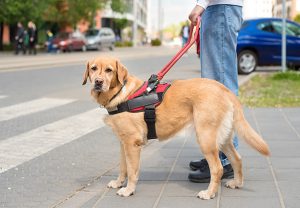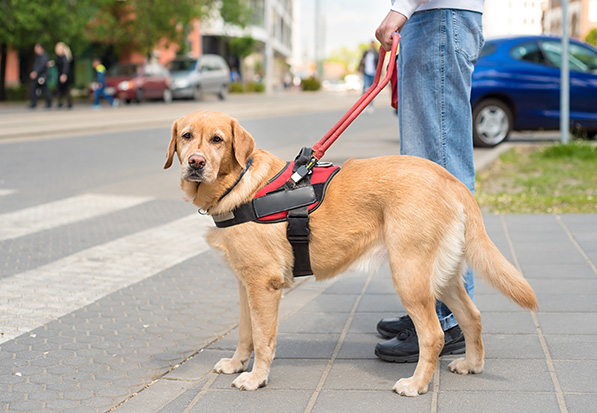
A growing trend in California has pet owners purchasing “service animal” vests for pets that clearly aren’t service animals, and then bring them into restaurants and other establishments. A 2015 UC Davis study found “a prevalence of misuse and misunderstanding of regulations and legislation on assistance dogs in California.” Because service animals are legally protected, many business owners feel their hands are tied, but you can act to protect both your business and the individuals who rely on service animals to perform essential, life-saving tasks.
Under the Americans with Disabilities Act (ADA), a service animal is a dog or miniature horse that’s individually trained to perform work or tasks for a person with a disability. A key word is “trained.” A service animal need not be trained professionally or undergo any specific training certification process. However, animals who naturally aid a person with a disability because they are cuddly or comforting aren’t considered trained and don’t qualify as service animals.
This is the key distinction; there are true service animals, and there are other types of assistance animals — such as emotional support or “comfort animals” and therapy animals. These “other types” don’t have access rights in the private business context under the ADA.
Service animals can be trained to provide a broad range of diverse functions for individuals with both physical and mental disabilities. For these reasons, it’s critical to not assume that a dog is a fraudulent service animal.
If a person claims their animal is a service animal, you should first ask the only two ADA-permitted questions you are allowed:
- Is the animal required because of a disability?
- What work or task has the animal been trained to perform?
Making these inquiries in their entirety forces the person who may be fraudulently representing that their pet is a service animal to affirmatively state that they need the animal due to a disability and to precisely describe what task that animal is trained to perform. While some pet owners will take their deceptions to the ends of the earth, most either won’t go this far or won’t be prepared to describe the task their pet has allegedly been trained to perform.
Legitimate service animals are also subject to limitations. Their access rights are conditional and not absolute: The animal must be housebroken, non-threatening and under the handler’s care and control. Therefore, if the animal becomes aggressive and begins to threaten the health and safety of other patrons (or other service animals), you can demand that the animal leave.
If you take this approach, which you are well within your rights to do, please keep in mind that you must still permit the animal’s handler to obtain the services or goods that person needs without the animal’s presence. For example, if the animal is asked to leave a restaurant because it isn’t housebroken, you should offer to either let the patron stay without the animal or take the food to go.
Christina Baggett, J.D., Associate Legal Counsel, Stryker
Liked this article? The June 2019 California Employer Update (CEU), a digital monthly newsletter, has a longer article on How to Prevent Service Animal Fraud. A yearly subscription is $99.99 (Executive members receive their 20 percent discount), and the CEU’s articles contain detailed content and expert insight on workplace trends, new laws and court rulings affecting California employers. Subscribe now!





